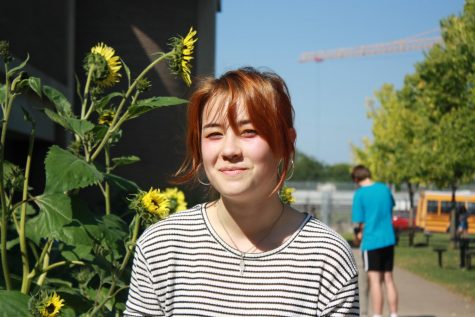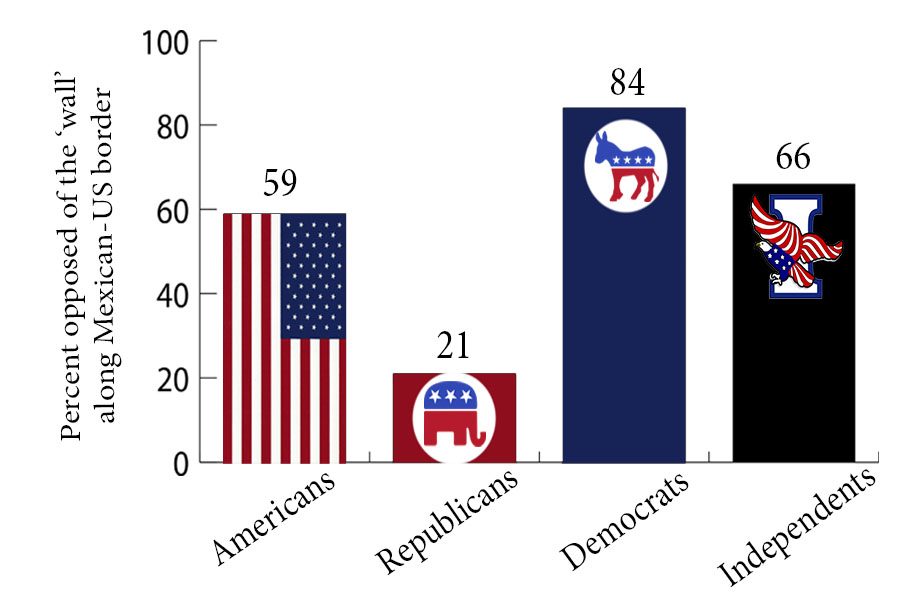‘The Wall’ presents unique challenges for Mexican-Americans
According to a CBS News poll taken in November, 2018; the majority of Americans oppose the construction of the wall along the Mexican-US border. 21% of the Republicans, 84% of Democrats, and 66% of Independents oppose the wall. “I think it wouldn’t stop anyone from getting here… Like people could find a way to get here regardless like you can’t stop it,” said junior Maria Genis.
President Donald Trump’s demand for a $5.7 million wall along the U.S.-Mexico border has brought immigration and border security to the center of public debate. The reason why the United States needs a wall along the Mexican border has cast asylum seekers and many Americans of Hispanic descent in an increasingly negative light.
In 2016, 30.2% of all individuals granted defensive asylum came from El Salvador, Guatemala, Honduras, and Mexico; according to the Department of Homeland Security. In 2015, around 3.4 million people from El Salvador, Guatemala, and Honduras (Northern Triangle), lived in the United States. About 55% of those people were undocumented immigrants; according to the Migration Policy Institute.
Junior Maria Genis said, “My family; they all come here for the opportunity for me to get an education… For a better job, and better money, and better life.”
The Northern Triangle countries are the some of the most violent countries in the world, due to the gangs, drug crimes, extortion, kidnapping, human trafficking, and lack of law enforcement. “We were just trying to move away from a dangerous place, because Mexico is not a place where they have [much] security, because there are some people who will try to steal you or try to rob you,” said Junior Emely Quintero. “You can’t blame a family for trying to protect each other.”
Many of the immigrants coming across the Southern border hope for a better life, but like many, Quintero says that her and her family were disappointed. “We thought that U.S. was the land of freedom and opportunity, but by doing this they are showing that what they were saying was wrong.”
Genis was disappointed because the proposal of a wall has affected her interactions with others. For example, when she sees a group of white people in her path and she may feel hesitant to pass them. “We don’t know if they’re really think[ing] about us as good people or not and we don’t want to risk it. At least I don’t,” said Genis.
“The President says… [that], ‘Mexicans are bad. They’re drug dealers. They’re violent. They rape people.’ It makes them fear [immigrants],” said Quintero.
“Everyone should have an open thought of what we feel as well… Just thinking about what we go through too. It’s not like a selfish thing, but just something to keep in mind. That we do go through a lot of things,” said Genis.
Since President Trump was elected to office, illegal immigration is something that he has felt very strongly to act upon. Despite the Wall being one of his largest promises to the American people, President Trump has also tried to crack down on immigration in other ways.
The consideration of Deferred Action for Childhood Arrivals (DACA), which allowed immigrant minors who were brought into the country illegally the ability to get a work permit and not be deported, has not been accepting any new requests since February 2018.
There was also a “zero-tolerance” immigration policy introduced by President Trump in April 2018, that is supposed to prosecute those coming into the country illegally. Since this updated policy, there have been thousands of undocumented people held at the border until they are prosecuted. Due to the large number of these undocumented immigrants, the U.S. Immigrants and Customs Enforcement (ICE) has had a lot of difficulty reuniting separated families.
Arrests made by ICE have continued to increase since President Trump has taken office as well. “I am Mexican, and seeing family being separated it makes me remind myself; that this could be my family one day,” said an anonymous source due to the context of legal status. “My parents will have to go to Mexico, and me and my brothers and sisters would have to stay here by ourselves trying to figure out how to bring them back.”
These political discussions are kept private mainly amongst immigrant families: “Americans [are] talking about it, but I haven’t seen any Mexicans talking about it… I feel like they don’t want to speak out, because they’re afraid that they might [get] in trouble. So it’s like basically; the fear is stopping them from speaking out on what they believe in, because they don’t have the opportunities or… privileges the Americans do,” said Quintero.
Quintero stressed how difficult it can be to talk to someone about this issue without getting too upset and feeding into the Mexican stereotype. “You have to be civil,” said Quintero. “You’re trying to be the bigger person… I just want to scream [because]… we have rights too.”

This is Mia Swanson’s third year with the Southerner, and their first year as the Southerner’s Managing Editor. Swanson is very excited to be this...

